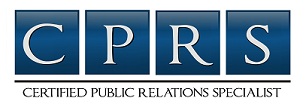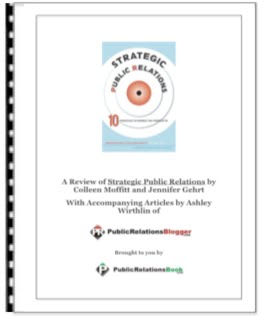Showing posts with label Why Use Public Relations. Show all posts
Showing posts with label Why Use Public Relations. Show all posts
________________________________________________________________________
 Because your customers care. Your competition probably care about it, too.
Because your customers care. Your competition probably care about it, too.
For companies of any size and most life-stages, public relations is something businesses should not ignore. (For reasons I say most life-stages, check out 4 Reasons Public Relations (Not Advertising) Builds a Brand.)
Public relations can do so much for a company, and yet, like social media, larger companies may see PR as an alternative to what they can already afford in advertising. (It is not an alternative to advertising.) PR is better than advertising. (Yes, I'm probably a bit biased.) It may take a bit more creativity and elbow grease, but the rewards and benefits of PR far outweigh advertising or marketing activities.
The tangible evidence of reduced costs is probably the one most used when trying to create advocates for PR, but there are more, intangible results that a PR team/firm can share with it's company/client. Those are:
I think you get the point. How does PR attain the above? By being the contact person of the company. By being aware of customers online. By being responsive to those customers online. And by being truthful, transparent, and engaging. With things like social media use, press releases, websites, blogs, etc., companies can be more connected with their buyers online, be more personable, and more personified.
As has been said time and time again, PR is more trustworthy than advertising. However, with the changes in technology, companies are more in control of their PR and are able to be more involved in the public relations process. In the past, companies were reliant on the media to cover them in a publication, and that was PR. This sort of PR was more credible than advertising because it was coming from another source.
The same is true today: advertising doesn't instill credibility or trust. In fact, it can often do the opposite. See the comments here about Toyota's attempts to rebuild its brand after their safety fiasco. What was a valiant effort to say "we're making a change" came across as a rather money-wasting endeavor. Had they simply shared with others, done interviews, and communicated with their customers online about this change in spending to increase safety, WOM (word of mouth) may have done more for them than a costly TV ad.
Even though Toyota (and BP) can afford advertisements, showing us the difference in ways other than a TV ad (like through PR) can be much more successful, and much more trustworthy. (BP's ads don't make me trust them more; it makes me wonder, "why tell me you're doing something, instead of simply doing it?")
As can be seen above, public relations today involves more things than simply getting mentioned in a publication. It involves social media, where a company can represent itself and be its own identity there. Companies can also have a blog, where they write about their company, their industry, etc., and try to set themselves apart from the crowd as a trusted source of information. This is also referred to as the process of positioning oneself as an authoritative figure. Over time, if you write on a subject, share information, or offer advice, people being to trust you and see you as a knowledgeable, go-to source.
Take this blog, for example. I often get emails asking for advice because of the success I've had in PR. I have little experience in PR, but my knowledge base is rather large due to the fact that I've been writing on the subject for so long. Surprised? Don't be. I don't pretend to be a PR expert with years and years of experience, but I do accept my role as a source of PR information.
So, as a company looking to increase followings, entice buyers to switch to your brand or become a loyal customer, or to simply share what you have to say, know that PR can be a great outlet because of the many, many places you can talk, communicate, and converse.
What's your take? Why care about PR if you can afford advertising?
Why Care About Public Relations?
________________________________________
 Because your customers care. Your competition probably care about it, too.
Because your customers care. Your competition probably care about it, too.For companies of any size and most life-stages, public relations is something businesses should not ignore. (For reasons I say most life-stages, check out 4 Reasons Public Relations (Not Advertising) Builds a Brand.)
Public relations can do so much for a company, and yet, like social media, larger companies may see PR as an alternative to what they can already afford in advertising. (It is not an alternative to advertising.) PR is better than advertising. (Yes, I'm probably a bit biased.) It may take a bit more creativity and elbow grease, but the rewards and benefits of PR far outweigh advertising or marketing activities.
The tangible evidence of reduced costs is probably the one most used when trying to create advocates for PR, but there are more, intangible results that a PR team/firm can share with it's company/client. Those are:
- Increased awareness. (For less money.)
- Increased trust. (For less money.)
- Increased loyalty. (For less money.)
I think you get the point. How does PR attain the above? By being the contact person of the company. By being aware of customers online. By being responsive to those customers online. And by being truthful, transparent, and engaging. With things like social media use, press releases, websites, blogs, etc., companies can be more connected with their buyers online, be more personable, and more personified.
As has been said time and time again, PR is more trustworthy than advertising. However, with the changes in technology, companies are more in control of their PR and are able to be more involved in the public relations process. In the past, companies were reliant on the media to cover them in a publication, and that was PR. This sort of PR was more credible than advertising because it was coming from another source.
The same is true today: advertising doesn't instill credibility or trust. In fact, it can often do the opposite. See the comments here about Toyota's attempts to rebuild its brand after their safety fiasco. What was a valiant effort to say "we're making a change" came across as a rather money-wasting endeavor. Had they simply shared with others, done interviews, and communicated with their customers online about this change in spending to increase safety, WOM (word of mouth) may have done more for them than a costly TV ad.
Even though Toyota (and BP) can afford advertisements, showing us the difference in ways other than a TV ad (like through PR) can be much more successful, and much more trustworthy. (BP's ads don't make me trust them more; it makes me wonder, "why tell me you're doing something, instead of simply doing it?")
As can be seen above, public relations today involves more things than simply getting mentioned in a publication. It involves social media, where a company can represent itself and be its own identity there. Companies can also have a blog, where they write about their company, their industry, etc., and try to set themselves apart from the crowd as a trusted source of information. This is also referred to as the process of positioning oneself as an authoritative figure. Over time, if you write on a subject, share information, or offer advice, people being to trust you and see you as a knowledgeable, go-to source.
Take this blog, for example. I often get emails asking for advice because of the success I've had in PR. I have little experience in PR, but my knowledge base is rather large due to the fact that I've been writing on the subject for so long. Surprised? Don't be. I don't pretend to be a PR expert with years and years of experience, but I do accept my role as a source of PR information.
So, as a company looking to increase followings, entice buyers to switch to your brand or become a loyal customer, or to simply share what you have to say, know that PR can be a great outlet because of the many, many places you can talk, communicate, and converse.
What's your take? Why care about PR if you can afford advertising?
Popular choices
- Non Gamstop Casino
- Mejores Salas De Póker
- Casino Non Aams
- Non Gamstop Casinos
- Siti Casino Online Non Aams
- Migliori Siti Casino Online
- UK Online Casinos Not On Gamstop
- Meilleur Casino En Ligne Live
- Non Gamstop Casino Sites UK
- Non Gamstop Casino Sites UK
- UK Casino Not On Gamstop
- Casinos Not On Gamstop
- Online Casino
- オンラインカジノ
- UK Casino Not On Gamstop
- UK Casino Not On Gamstop
- Reputable Non Gamstop Casinos
- Casinos Not On Gamstop
- Best Non Gamstop Casinos
- Non Gamstop Casino
- Casinos Not On Gamstop
- Slots Not On Gamstop
- Non Gamstop Casino
- Casino Non Aams
- Casinos Not On Gamstop
- Betting Sites Not On Gamstop
- Casino Online Italia
- Casino En Ligne
- Casino En Ligne Belgique
- Siti Scommesse Bitcoin
- KYC 인증 없는 카지노
- Sites De Paris Sportif Fiables
- Casino En Ligne France
- Casino Non Aams Prelievo Immediato
- Meilleur Casino En Ligne Belgique
- Meilleur Casino En Ligne 2026
- Meilleur Casino En Ligne
- Casino En Ligne 2026
- Casino En Ligne France
________________________________________________________________________
 Public relations is often seen as an alternative to advertising; I hope to change that, because it is not. While advertising and PR are often lumped together (and, again, one is often used as an alternative to the other), they are two different and separate activities that are both needed to propel a company forward. (For a start-up or for a new company looking to build their brand, advertising won't do much good, however. Read more about why that is here: 4 Reasons Public Relations (Not Advertising) Builds a Brand.) They do, however, work well when used together as components of the company's overall outreach program.
Public relations is often seen as an alternative to advertising; I hope to change that, because it is not. While advertising and PR are often lumped together (and, again, one is often used as an alternative to the other), they are two different and separate activities that are both needed to propel a company forward. (For a start-up or for a new company looking to build their brand, advertising won't do much good, however. Read more about why that is here: 4 Reasons Public Relations (Not Advertising) Builds a Brand.) They do, however, work well when used together as components of the company's overall outreach program.
Though the economy is beginning to turn around, budgets for public relations still seem to be somewhat of a hard thing to come by. To get more of a budget allotted to you as the PR professional(s) in your company, you have to sell its benefits. How do you expect executives to want to give you a budget if the reasons for utilizing and partaking in PR activities are never defined? On top of selling the benefits of PR, try to tie the PR activities into other business activities, such as marketing and business development. They are, after all, becoming more and more similar with the tools and tactics available to companies online.
Public relations can be seen as a necessary evil, but it's a rather useful activity for businesses to partake in; not only are you now able to connect with your buyers one-on-one (which was never done (or able to be done) in the past), but you can help to shape your public image. In this way, PR is crossing the lines that separated it from marketing. You can send out a press release, respond to customers, and be active on social media; these are all things that can help to shape how the public sees you. In the past, companies had to hope the media would portray them in a positive light. Now, when that's not done, a company can respond in the attempts to remedy an issue/potential crisis or write a letter to an editor to ask for a correction.
What does this all mean for you and your company? Well, that depends. How connected do you want to be with your audience? How much do you value customer/buyer feedback? Do you want to stay up-to-date with what your buyers are looking for? PR can assist in all of this (and more). What you need to do first is to establish your needs, goals, and objectives and those of your buyers. Then, and only then, can you move forward by conducting proactive, effective, and well-planned public relations activities.
Public relations isn't all that difficult, and more often than not it does not require the assistance of a "professional". Doing PR correctly requires an understanding of your audience and your company, both being things that you can learn and know. From there, it requires an understanding of how to implement tactics that you've defined from your strategies. (For more on tactics and strategies, read ). It may make sense to hire a consultant to get you started but don't be afraid to try things out.
Why Use Public Relations; What Role Does it Play for Me & My Company?
________________________________________
 Public relations is often seen as an alternative to advertising; I hope to change that, because it is not. While advertising and PR are often lumped together (and, again, one is often used as an alternative to the other), they are two different and separate activities that are both needed to propel a company forward. (For a start-up or for a new company looking to build their brand, advertising won't do much good, however. Read more about why that is here: 4 Reasons Public Relations (Not Advertising) Builds a Brand.) They do, however, work well when used together as components of the company's overall outreach program.
Public relations is often seen as an alternative to advertising; I hope to change that, because it is not. While advertising and PR are often lumped together (and, again, one is often used as an alternative to the other), they are two different and separate activities that are both needed to propel a company forward. (For a start-up or for a new company looking to build their brand, advertising won't do much good, however. Read more about why that is here: 4 Reasons Public Relations (Not Advertising) Builds a Brand.) They do, however, work well when used together as components of the company's overall outreach program.Though the economy is beginning to turn around, budgets for public relations still seem to be somewhat of a hard thing to come by. To get more of a budget allotted to you as the PR professional(s) in your company, you have to sell its benefits. How do you expect executives to want to give you a budget if the reasons for utilizing and partaking in PR activities are never defined? On top of selling the benefits of PR, try to tie the PR activities into other business activities, such as marketing and business development. They are, after all, becoming more and more similar with the tools and tactics available to companies online.
Public relations can be seen as a necessary evil, but it's a rather useful activity for businesses to partake in; not only are you now able to connect with your buyers one-on-one (which was never done (or able to be done) in the past), but you can help to shape your public image. In this way, PR is crossing the lines that separated it from marketing. You can send out a press release, respond to customers, and be active on social media; these are all things that can help to shape how the public sees you. In the past, companies had to hope the media would portray them in a positive light. Now, when that's not done, a company can respond in the attempts to remedy an issue/potential crisis or write a letter to an editor to ask for a correction.
What does this all mean for you and your company? Well, that depends. How connected do you want to be with your audience? How much do you value customer/buyer feedback? Do you want to stay up-to-date with what your buyers are looking for? PR can assist in all of this (and more). What you need to do first is to establish your needs, goals, and objectives and those of your buyers. Then, and only then, can you move forward by conducting proactive, effective, and well-planned public relations activities.
Public relations isn't all that difficult, and more often than not it does not require the assistance of a "professional". Doing PR correctly requires an understanding of your audience and your company, both being things that you can learn and know. From there, it requires an understanding of how to implement tactics that you've defined from your strategies. (For more on tactics and strategies, read ). It may make sense to hire a consultant to get you started but don't be afraid to try things out.
Subscribe to:
Posts (Atom)





